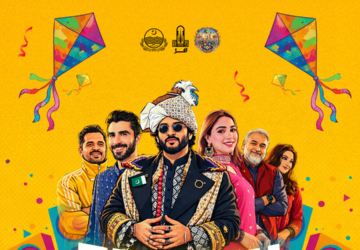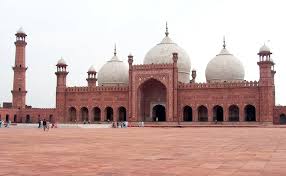Just to start you guys off – my dad’s a Muslim and my mom’s a Christian. And to answer the question that usually comes next, I’m a Muslim.

Now, a bit of a background: my parents were lovebirds who got married after their fair share of struggle – which is another story for another day.
Growing up in this interfaith household, I’ve learned a lot. Whether it’s about both the religions, about how people around you respond to finding out about how your household works or even tolerance when someone points fingers in your direction – life in an interfaith household teaches you a lot of lessons that shape who you are. Now I can only speak from my own experience, but I do know that a lot of people from similar backgrounds tend to be in the same boat.
So, here’s a bunch of things you learn when you grow up in an interfaith household:
Log sawaal bohot poochtay hain
Understandably, people have a lot of questions about the family dynamics. They want to know what religion you and your siblings follow – either out of genuine curiosity or because they can’t keep their naak out of your business. But seriously, har jagah jawaab dena parhta hai. Try getting your passport made without holding up a line. Better yet, try attending an Islamiat class with an extremely backward teacher who puts you on the spot all the time. While you don’t really mind educating people on the matter with your limited stack of knowledge, it’s hard to tell what their intention is or where they’re coming from.

You’ll get asked if your non-Muslim parent intends to convert
My mother is a Christian, so the whole you’re-a-woman-you-can’t-marry-a-non-Muslim argument doesn’t work that well when it comes to our family. However, some of the more – uh, narrow-minded people will always ask you why your parent has not yet converted. Honestly, this does get a little annoying. Someone else’s religion isn’t their business. Maybe they should stay out of it.

If the answer is that your non-Muslim parent does not intend to convert, the conversation has a pretty great chance of going south real quick
Throwback to the time(s) I got told my mom is going to hell for existing. Oh, and my dad’s going to hell for marrying her. And we’re all going to hell because we’re her kids. Fun conversation, really. Sab hee jahannum main honge. Because certain self-righteous devotees believe so. Guess we’ll see them there.

The exposure to spirituality and diverse traditions is great
Personally, I’ve attended masses and I’ve been to masjids. The way you feel in church is honestly the exact same way you feel in a masjid. Whether you listen to a priest’s passionate sermon amongst an entire group of people who have congregated solely for worship, or you bow your head in sajda – the sense of being in the presence of God is heightened. You get to talk to nuns and priests, extracting bits and pieces of their wisdom. On the other hand, you also get to obtain knowledge about your own religion, courtesy your maulvi sahab. Additionally, you learn all about the two cultures and how they’re actually pretty similar. Because at the end of the day, we’re still Pakistanis.
You quite literally get the best of both worlds
Both the Eids, Easter, Christmas, and pretty much any other remotely significant event is a cause for celebration. On one hand, you get Eidi from you parents and on the other, you get chocolate eggs for Easter and a Christmas tree.

A lot of people will disapprove of your family
While you do learn to block out a lot of the unnecessary disapproval and the occasional offensive remarks about your family, you do tend to wish that these people could legit follow the actual teachings of their religion and not force their opinion on yours. However, growing up with this disapproval around you makes you ask more questions back home and be more aware of how to deal with the people your rub shoulders with.

However, numerous people will also be very accepting
While there are the few who don’t get how the whole interfaith household system works, there are others who are intrigued by it and are genuinely interested in knowing what you know. They wholeheartedly accept the dynamic and actually make an effort to figure out how things work for you. God bless these people, tbh.

Over a period of time, you tend to get a little defensive about certain matters
Growing up, if you’ve had enough fingers pointed at your family, you do tend to adopt a defensive stance and are a bit wary of discussing this part of your life. It can get the better of you in terms of your emotions and you may end up defending yourself in these matters with a passion that others don’t comprehend.
Attacks fueled by discrimination never sit well at home
From time to time, you hear about attacks that are perpetrated based on the victim’s faith. Or you hear about certain other cases that don’t seem to make sense to you. Those, while not a cause of tension, do become a source of sorrow to a huge extent. When you’re from a background that teaches you nothing but acceptance, you can’t help but feel despondent every time interfaith tensions arise.
Kuch aur nahi toh you definitely learn how to be patient and tolerant
Quite obviously, your extended families are also from different religious backgrounds. Growing up with all these people from two different faiths in an environment where there’s more than enough room for both faith to coexist and thrive, you learn each other’s ways. More than anything else, you learn that there’s absolutely no difference between people from different religious problems. Sab ki wohi problems hoti hain.

You realize that seriously, kuch ziada faraq nahi hai
My mother is up at the crack of dawn preparing Sehri for us in Ramazan. Despite being a working woman who spends hours laboring at a hospital, she will come back home and be mindful of the fact that we’re fasting. Bari raat pe if we’re not praying, she’ll make it a point to nag us till we do. Similarly, during the month of Lent when she’s fasting, we’re mindful of her needs and limitations. It’s a two-way street, based on a sense of mutual understanding.
Overall, the major takeaway will always be that at the end of the day, it boils down to the kind of individual you are. It all comes down to how you conduct yourself in a room full of people who differ from you in a way you may not comprehend. You can always choose to learn and broaden their perspective. Or, you can follow your path and let others follow theirs. In all honesty, it’s truly as simple as that. There is no compulsion and judgment in religion. Perhaps, many of us need to remember that before parading forward on our high horses of self-righteousness and pride.
Picture of St Patrick’s Cathedral: Shahi Hasan/Flickr
Picture of Tooba Masjid: mycitykarachicity.blogspot.com








